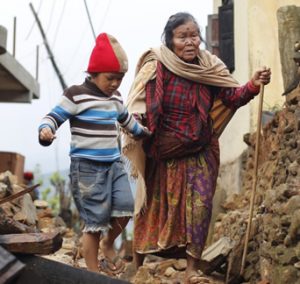Project Narrative
 Do the rules and conventions that governed cultural and social life and political decision-making before a disaster continue to be valued in its aftermath? What kinds of change occur as a result of such a disaster? Which of these changes is temporary and which is permanent? This project, which consists of three interwoven strands, aims to explore these questions.
Do the rules and conventions that governed cultural and social life and political decision-making before a disaster continue to be valued in its aftermath? What kinds of change occur as a result of such a disaster? Which of these changes is temporary and which is permanent? This project, which consists of three interwoven strands, aims to explore these questions.
First, the project will investigate the post-earthquake cultural and political discourse in Nepal. Nepal emerged from a ten-year civil war in 2006, and the country’s main political players then embarked upon the long process of transition from a monarchical Hindu state to a democratic federal republic. The 2015 earthquakes had a major impact upon this process. The project will explore the ways in which they influenced the ongoing political, media and literary discourse on a number of key cultural, social and political issues.
Second, the project will ask who it is that decides which elements of an aid-dependent country’s destroyed physical heritage is worth restoring. It will investigate the extent to which the selection and prioritisation of sites and buildings for restoration is driven by what is held locally to be most ‘dear’, and to what extent by the evaluations of external donors and heritage experts.
Third, the project will draw historical comparisons between the sociocultural and political impacts of the 2015 quakes and those of the major quakes that struck Nepal during earlier periods of political and cultural transition in 1833 and 1934. The project will explore archives in London, Delhi and Kathmandu for contemporaneous documentation that has not been published or analysed in any detail.
